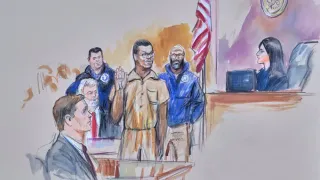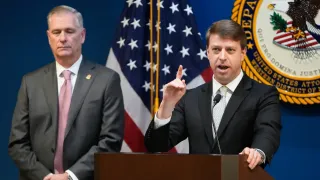May 15, 2018
Pope Gets An Unprecedented Close-Up, Courtesy of Wim Wenders
Jake Coyle READ TIME: 3 MIN.
When Wim Wenders first met Pope Francis before shooting the documentary "Pope Francis: A Man of his Word," the pontiff warmly greeted the German filmmaker before warning Wenders that he is no movie buff.
"He said: 'I've heard a lot about you but you must know I don't know much about cinema and I haven't seen a single one of your films. Actually, I don't know almost any movies,'" says Wenders.
Later, once the film was nearly completed, Wenders inquired if Pope Francis wanted to see it. The response came that while the Pope was satisfied with the experience, he wouldn't see the movie: "It's just not my thing."
And yet, in "A Man of His Word" Pope Francis becomes the first pontiff to participate in such a movie. The film premiered Sunday at the Cannes Film Festival, though the Pope, who's meeting this week in Rome with Chilean bishops to discuss Chile's sex abuse crisis, was not in Cannes - robbing the festival of the sight of the pontiff on the red carpet.
Focus Features will release the film - an unprecedented big-screen close-up for the Pope - nationwide Friday, bringing the world's most recognized religious figure into cinemas alongside the likes of "Deadpool 2" and "Show Dogs."
Wenders, the Oscar-winning 72-year-old filmmaker of "Wings of Desire," ''Paris, Texas" and "Buena Vista Social Club," says he received "carte blanche" from the Vatican, and final cut. He conducted four lengthy interviews spread out over four years, all inside Vatican walls, and was granted extensive access to the Vatican's video library.
The film, shot with Errol Morris' "Interrotron" camera apparatus that allows a subject to speak directly into the camera, is essentially an intimate audience with Pope Francis as he ruminates on global challenges facing the world today.
In between footage of Pope Francis visiting everywhere from a joint session of U.S. Congress to a Philadelphia prison, from an African children's hospital to a Greek migrant camp, the spiritual leader discusses faith in the modern world, poverty, pollution, female equality, church sex scandals, the suffering of migrants and economic inequality.
Pope Francis arrived for their first interview, Wenders says, unaccompanied and without a cell phone.
"My first question was: How come for many people today, God is no longer a reality?" Wenders said in an interview at Cannes.
Wenders lets the audience see the world through the eyes of the Pope, whom he calls "a man who lives what he preaches."
"You don't really realize that whenever he travels, he's also seeing prisons, hospitals, he's seeing camps, he's seeing slums. He goes to all these places it hurts to go," said Wenders. "And nobody else on this planet does that. I don't know of any other person who meets both heads of state and goes to see the prisoners. I don't know that person."
The project was the brainchild of Monsignor Dario Vigano, who, until he resigned from the position earlier this year in a scandal over falsifying a letter from the retired Pope Benedict XVI, was the Vatican's head of communications. Vigano is a renown cinephile who, unlike Pope Francis, was very familiar with Wenders' films and had met the director at the Venice Film Festival.
In 2013, Vigano approached Wenders with the idea of making a film. He left it to Wenders to create the concept.
He made it quite clear from the beginning he just wanted to instigate this," said Wenders. "He said, 'No one's going to think you can make a movie with the Pope, but I want to plant the idea.'"
The Argentine-born, 81-year-old Pope Francis, the first pope from the Americas, has in his five years on the papal throne been a globally beloved figure hailed by many for his humility and for transforming the Church. But he also stirred disquiet from the Vatican's more conservative elements - and Wenders was conscious of the possibility that turning Pope Francis into a movie star might be objectionable to some.
"We did the film under the radar from the beginning," says Wenders. "We didn't want it to be public knowledge but it was also maybe not to, inside the church, arise too much attention. But the primary concern was to keep it under the lid before we knew that we had a film."
Wenders, who was raised Catholic and later converted to Protestantism, identifies himself as a Christian and a believer who attends different kinds of churches and admires theologians of various faiths. "They knew they didn't approach a Catholic," he says.
___
Follow AP Film Writer Jake Coyle on Twitter at: http://twitter.com/jakecoyleAP






